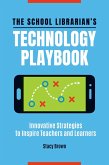Sylvia D. Hall-Ellis, Stacey L. Bowers, Christopher Hudson, Claire Williamson, Joanne Patrick
Librarian's Handbook for Seeking, Writing, and Managing Grants (eBook, PDF)
39,95 €
39,95 €
inkl. MwSt.
Sofort per Download lieferbar

20 °P sammeln
39,95 €
Als Download kaufen

39,95 €
inkl. MwSt.
Sofort per Download lieferbar

20 °P sammeln
Jetzt verschenken
Alle Infos zum eBook verschenken
39,95 €
inkl. MwSt.
Sofort per Download lieferbar
Alle Infos zum eBook verschenken

20 °P sammeln
Sylvia D. Hall-Ellis, Stacey L. Bowers, Christopher Hudson, Claire Williamson, Joanne Patrick
Librarian's Handbook for Seeking, Writing, and Managing Grants (eBook, PDF)
- Format: PDF
- Merkliste
- Auf die Merkliste
- Bewerten Bewerten
- Teilen
- Produkt teilen
- Produkterinnerung
- Produkterinnerung

Bitte loggen Sie sich zunächst in Ihr Kundenkonto ein oder registrieren Sie sich bei
bücher.de, um das eBook-Abo tolino select nutzen zu können.
Hier können Sie sich einloggen
Hier können Sie sich einloggen
Sie sind bereits eingeloggt. Klicken Sie auf 2. tolino select Abo, um fortzufahren.

Bitte loggen Sie sich zunächst in Ihr Kundenkonto ein oder registrieren Sie sich bei bücher.de, um das eBook-Abo tolino select nutzen zu können.
Learn the dynamics of the grant-seeking process, including proposal writing and grant management, for public, school, and academic librarians. A comprehensive book that covers the full spectrum of the grant process, Librarian's Handbook for Seeking, Writing, and Managing Grants is designed to provide all the information necessary for librarians and educators to become effective members of grant-development and management teams. Written in an easy-to-understand, succinct format, it will be invaluable even for those with little or no background knowledge and regardless of the size or type of…mehr
- Geräte: PC
- mit Kopierschutz
- eBook Hilfe
- Größe: 2.14MB
Andere Kunden interessierten sich auch für
![Librarian's Guide to Writing for Professional Publication (eBook, PDF) Librarian's Guide to Writing for Professional Publication (eBook, PDF)]() Marta Mestrovic DeyrupLibrarian's Guide to Writing for Professional Publication (eBook, PDF)35,95 €
Marta Mestrovic DeyrupLibrarian's Guide to Writing for Professional Publication (eBook, PDF)35,95 €![Librarian's Guide to Online Searching (eBook, PDF) Librarian's Guide to Online Searching (eBook, PDF)]() Christopher C. BrownLibrarian's Guide to Online Searching (eBook, PDF)46,95 €
Christopher C. BrownLibrarian's Guide to Online Searching (eBook, PDF)46,95 €![A Librarian's Guide to Engaging Families in Learning (eBook, PDF) A Librarian's Guide to Engaging Families in Learning (eBook, PDF)]() A Librarian's Guide to Engaging Families in Learning (eBook, PDF)42,95 €
A Librarian's Guide to Engaging Families in Learning (eBook, PDF)42,95 €![The School Librarian's Technology Playbook (eBook, PDF) The School Librarian's Technology Playbook (eBook, PDF)]() Stacy BrownThe School Librarian's Technology Playbook (eBook, PDF)35,95 €
Stacy BrownThe School Librarian's Technology Playbook (eBook, PDF)35,95 €![The Librarian's Complete Guide to Involving Parents Through Children's Literature (eBook, PDF) The Librarian's Complete Guide to Involving Parents Through Children's Literature (eBook, PDF)]() Anthony D. FredericksThe Librarian's Complete Guide to Involving Parents Through Children's Literature (eBook, PDF)26,95 €
Anthony D. FredericksThe Librarian's Complete Guide to Involving Parents Through Children's Literature (eBook, PDF)26,95 €![The Librarian's Companion (eBook, PDF) The Librarian's Companion (eBook, PDF)]() Vladimir WertsmanThe Librarian's Companion (eBook, PDF)69,95 €
Vladimir WertsmanThe Librarian's Companion (eBook, PDF)69,95 €![The Reference Librarian's Bible (eBook, PDF) The Reference Librarian's Bible (eBook, PDF)]() The Reference Librarian's Bible (eBook, PDF)49,95 €
The Reference Librarian's Bible (eBook, PDF)49,95 €-
-
-
Learn the dynamics of the grant-seeking process, including proposal writing and grant management, for public, school, and academic librarians. A comprehensive book that covers the full spectrum of the grant process, Librarian's Handbook for Seeking, Writing, and Managing Grants is designed to provide all the information necessary for librarians and educators to become effective members of grant-development and management teams. Written in an easy-to-understand, succinct format, it will be invaluable even for those with little or no background knowledge and regardless of the size or type of library or information center. Recognizing that grants are developed through a sequential process, the volume focuses on the fundamental components of grant planning, grant writing, and grant management. Readers will learn to identify potential federal and state funding sources, organize and manage the proposal development process, do research, and establish and encourage participation on local development teams. They will also learn about specific aspects of grant management, such as budget and finance monitoring; hiring; research compliance and policies; sub-agreements and partnership forms; and reporting requirements.
Produktdetails
- Produktdetails
- Verlag: Bloomsbury Publishing Inc
- Seitenzahl: 336
- Altersempfehlung: ab 7 Jahre
- Erscheinungstermin: 18. Mai 2011
- Englisch
- ISBN-13: 9781591588726
- Artikelnr.: 37977689
- Verlag: Bloomsbury Publishing Inc
- Seitenzahl: 336
- Altersempfehlung: ab 7 Jahre
- Erscheinungstermin: 18. Mai 2011
- Englisch
- ISBN-13: 9781591588726
- Artikelnr.: 37977689
- Herstellerkennzeichnung Die Herstellerinformationen sind derzeit nicht verfügbar.
Sylvia D. Hall-Ellis is an associate professor of library and information science in the Morgridge College of Education at the University of Denver.
Stacey L. Bowers is the Outreach and Access Services librarian for the Westminster Law Library in the Sturm College of Law at the University of Denver.
Christopher Hudson is the project coordinator for the Law Librarianship Fellows Program at the University of Denver that is funded by the Institute for Museum and Library Services.
Claire Williamson is the Outreach Center coordinator for the Law Librarianship Fellows Program at the University of Denver that is funded by the Institute for Museum and Library Services.
Joanne Patrick is the administrator for the Westminster Law Library in the Sturm College of Law at the University of Denver.
Stacey L. Bowers is the Outreach and Access Services librarian for the Westminster Law Library in the Sturm College of Law at the University of Denver.
Christopher Hudson is the project coordinator for the Law Librarianship Fellows Program at the University of Denver that is funded by the Institute for Museum and Library Services.
Claire Williamson is the Outreach Center coordinator for the Law Librarianship Fellows Program at the University of Denver that is funded by the Institute for Museum and Library Services.
Joanne Patrick is the administrator for the Westminster Law Library in the Sturm College of Law at the University of Denver.
Preface Introduction Part 1: Grant Development 1 Planning: The Core of
Proposal Development Planning Defined The Rationale for Planning Readiness
for Planning Historical Commitment to Planning The Reward System for Staff
Contributions Culture and Complexity of the Organization Rate of Growth
Financial Resources Ready Reference Handbooks and Tools Access and
Availability of Information Willingness to Take Risks General Guidelines
for the Predevelopment Planning Process Calculating the Funding Potential
Managing Proposal Development Selecting Partner Organizations Calendar
Development Planning Meetings Initial Planning Meeting Conceptual Design
Meeting Working Meetings Decisions Relating to Proposal Preparation Writing
and Editing Issues Document Formatting Issues 2 Project Design Needs
Statement Context of the Problem Justification for the Project Aspect to be
Addressed The Importance of a Lucid Mission Statement Project Goal
Development The Relationship of the Goal and Objectives Conceptual Design
of the Project Preliminary Checklists Methodologies The Dynamic Process
Underlying Project Design Laying the Groundwork for a Collaborative Effort
Steps to Prepare the Project Design Project Management Establishing an
Advisory Group Orientation for the Advisory Group Parental Involvement with
the Project 3 Project Narrative Proposal Functions Components of the
Proposal Cover Sheet (Face Sheet) Abstract Table of Contents Introduction
Needs Assessment Goals, Objectives, and Activities Service Programs
Evaluation Design and Research Implications Dissemination of Findings,
Results, and Products Plan for Continued Support (Sustainability) Budget
Appendices Letter of Transmittal Proposal Writing, Design, and
Organizational Guidelines 4 Project Personnel Project Staffing Requirements
Requirements from the Funding Agency Requirements from the Applicant
Capabilities Statements for Key Project Personnel Principal Investigator
(or Project Director) Support Staff Local Personnel Available to the
Project Library Administrators Librarians in Public Library and Academic
Library Settings School Librarians Instructional Personnel Parents 5
Project Evaluation Overview of the Evaluation Process Evaluation Methods
Formative Evaluation Summative Evaluation The Basics of Evaluation
Selecting an Evaluator Internal Evaluation Teams External Evaluation Teams
Planning the Evaluation Analyzing Evaluation Data Writing the Evaluation
Report Executive Summary Formative Evaluation Summative Evaluation 6 Budget
Development The Role of the Budget Budget Preparation Ground Rules for
Budget Preparation Identify the Costs Drafting the Budget Reviewing the
Budget Additional Budgeting Considerations The Influence of Funding
Agencies on Budget Formatting Budget Adjustments and Amendments
Subcontracts 7 Appendices The Roles of Appendices Grant Compliances and
Assurances Demographic Data and Community Descriptions Profiles of
Participating Institutions Curriculum Vitae and Job Descriptions Standards,
Benchmarks, and Academic Achievement Literature Review, "Best Practices,"
and Models Letters of Commitment and Letters of Support Bibliography of
Resources Consulted Part 2: Implementation and Management 8 After the
Proposal Activities Between the Submission and Decision Strategies for
Successful Grant Recipients Strategies for Organizations Failing to Obtain
Grant Funding Poor Grantmanship Practices The Narrative The Budget The
Details Resubmitting the Proposal 9 Implementing the Project Getting
Started: Celebrate, Praise, and Communicate Notifying Partners Accepting
the Award Review Project Award Information and Documents Provided by the
Grantor The Project Handoff Acceptance Paperwork Internal Accounts and
Fiscal Paperwork Staffing and Training Hiring Project Personnel Employees,
Consultants, and Volunteers Developing Position Descriptions Advertising
the Position The Interview Process Developing Interview Questions After the
Hiring Decision Is Made Setting Up the Project Office Announcing the Grant
Award Internal Promotion of the Grant Award Traditional Ways of Promoting
the Grant Project Web Sites and Other Electronic Publications Online
Surveys Promoting the Grant Project Using Social Media Building an Online
Community to Support the Grant Project Overlooked Opportunities to Promote
the Grant Project 10 Managing the Project Day-to-Day Organizational
Structure: The Big Picture Roles and Responsibilities: The Details
Operations Managing People Management Styles Leadership and Team Building
Deadlines, Calendars, and Timelines Planning for the Unexpected 11 Project
Accountability Fiscal Management Accounting and Financial Management Budget
Modifications Cost Share Legal Overview and Issues Components of a Contract
Contract Terms and Their Importance General Contract Tips Grants versus
Contracts Specific Types of Agreements in the Grant Context Project
Evaluation Conducting Evaluations Writing Project Reports Deliverables 12
Project Closeout Glossary of Grant Terms Bibliography Index
Proposal Development Planning Defined The Rationale for Planning Readiness
for Planning Historical Commitment to Planning The Reward System for Staff
Contributions Culture and Complexity of the Organization Rate of Growth
Financial Resources Ready Reference Handbooks and Tools Access and
Availability of Information Willingness to Take Risks General Guidelines
for the Predevelopment Planning Process Calculating the Funding Potential
Managing Proposal Development Selecting Partner Organizations Calendar
Development Planning Meetings Initial Planning Meeting Conceptual Design
Meeting Working Meetings Decisions Relating to Proposal Preparation Writing
and Editing Issues Document Formatting Issues 2 Project Design Needs
Statement Context of the Problem Justification for the Project Aspect to be
Addressed The Importance of a Lucid Mission Statement Project Goal
Development The Relationship of the Goal and Objectives Conceptual Design
of the Project Preliminary Checklists Methodologies The Dynamic Process
Underlying Project Design Laying the Groundwork for a Collaborative Effort
Steps to Prepare the Project Design Project Management Establishing an
Advisory Group Orientation for the Advisory Group Parental Involvement with
the Project 3 Project Narrative Proposal Functions Components of the
Proposal Cover Sheet (Face Sheet) Abstract Table of Contents Introduction
Needs Assessment Goals, Objectives, and Activities Service Programs
Evaluation Design and Research Implications Dissemination of Findings,
Results, and Products Plan for Continued Support (Sustainability) Budget
Appendices Letter of Transmittal Proposal Writing, Design, and
Organizational Guidelines 4 Project Personnel Project Staffing Requirements
Requirements from the Funding Agency Requirements from the Applicant
Capabilities Statements for Key Project Personnel Principal Investigator
(or Project Director) Support Staff Local Personnel Available to the
Project Library Administrators Librarians in Public Library and Academic
Library Settings School Librarians Instructional Personnel Parents 5
Project Evaluation Overview of the Evaluation Process Evaluation Methods
Formative Evaluation Summative Evaluation The Basics of Evaluation
Selecting an Evaluator Internal Evaluation Teams External Evaluation Teams
Planning the Evaluation Analyzing Evaluation Data Writing the Evaluation
Report Executive Summary Formative Evaluation Summative Evaluation 6 Budget
Development The Role of the Budget Budget Preparation Ground Rules for
Budget Preparation Identify the Costs Drafting the Budget Reviewing the
Budget Additional Budgeting Considerations The Influence of Funding
Agencies on Budget Formatting Budget Adjustments and Amendments
Subcontracts 7 Appendices The Roles of Appendices Grant Compliances and
Assurances Demographic Data and Community Descriptions Profiles of
Participating Institutions Curriculum Vitae and Job Descriptions Standards,
Benchmarks, and Academic Achievement Literature Review, "Best Practices,"
and Models Letters of Commitment and Letters of Support Bibliography of
Resources Consulted Part 2: Implementation and Management 8 After the
Proposal Activities Between the Submission and Decision Strategies for
Successful Grant Recipients Strategies for Organizations Failing to Obtain
Grant Funding Poor Grantmanship Practices The Narrative The Budget The
Details Resubmitting the Proposal 9 Implementing the Project Getting
Started: Celebrate, Praise, and Communicate Notifying Partners Accepting
the Award Review Project Award Information and Documents Provided by the
Grantor The Project Handoff Acceptance Paperwork Internal Accounts and
Fiscal Paperwork Staffing and Training Hiring Project Personnel Employees,
Consultants, and Volunteers Developing Position Descriptions Advertising
the Position The Interview Process Developing Interview Questions After the
Hiring Decision Is Made Setting Up the Project Office Announcing the Grant
Award Internal Promotion of the Grant Award Traditional Ways of Promoting
the Grant Project Web Sites and Other Electronic Publications Online
Surveys Promoting the Grant Project Using Social Media Building an Online
Community to Support the Grant Project Overlooked Opportunities to Promote
the Grant Project 10 Managing the Project Day-to-Day Organizational
Structure: The Big Picture Roles and Responsibilities: The Details
Operations Managing People Management Styles Leadership and Team Building
Deadlines, Calendars, and Timelines Planning for the Unexpected 11 Project
Accountability Fiscal Management Accounting and Financial Management Budget
Modifications Cost Share Legal Overview and Issues Components of a Contract
Contract Terms and Their Importance General Contract Tips Grants versus
Contracts Specific Types of Agreements in the Grant Context Project
Evaluation Conducting Evaluations Writing Project Reports Deliverables 12
Project Closeout Glossary of Grant Terms Bibliography Index
Preface Introduction Part 1: Grant Development 1 Planning: The Core of
Proposal Development Planning Defined The Rationale for Planning Readiness
for Planning Historical Commitment to Planning The Reward System for Staff
Contributions Culture and Complexity of the Organization Rate of Growth
Financial Resources Ready Reference Handbooks and Tools Access and
Availability of Information Willingness to Take Risks General Guidelines
for the Predevelopment Planning Process Calculating the Funding Potential
Managing Proposal Development Selecting Partner Organizations Calendar
Development Planning Meetings Initial Planning Meeting Conceptual Design
Meeting Working Meetings Decisions Relating to Proposal Preparation Writing
and Editing Issues Document Formatting Issues 2 Project Design Needs
Statement Context of the Problem Justification for the Project Aspect to be
Addressed The Importance of a Lucid Mission Statement Project Goal
Development The Relationship of the Goal and Objectives Conceptual Design
of the Project Preliminary Checklists Methodologies The Dynamic Process
Underlying Project Design Laying the Groundwork for a Collaborative Effort
Steps to Prepare the Project Design Project Management Establishing an
Advisory Group Orientation for the Advisory Group Parental Involvement with
the Project 3 Project Narrative Proposal Functions Components of the
Proposal Cover Sheet (Face Sheet) Abstract Table of Contents Introduction
Needs Assessment Goals, Objectives, and Activities Service Programs
Evaluation Design and Research Implications Dissemination of Findings,
Results, and Products Plan for Continued Support (Sustainability) Budget
Appendices Letter of Transmittal Proposal Writing, Design, and
Organizational Guidelines 4 Project Personnel Project Staffing Requirements
Requirements from the Funding Agency Requirements from the Applicant
Capabilities Statements for Key Project Personnel Principal Investigator
(or Project Director) Support Staff Local Personnel Available to the
Project Library Administrators Librarians in Public Library and Academic
Library Settings School Librarians Instructional Personnel Parents 5
Project Evaluation Overview of the Evaluation Process Evaluation Methods
Formative Evaluation Summative Evaluation The Basics of Evaluation
Selecting an Evaluator Internal Evaluation Teams External Evaluation Teams
Planning the Evaluation Analyzing Evaluation Data Writing the Evaluation
Report Executive Summary Formative Evaluation Summative Evaluation 6 Budget
Development The Role of the Budget Budget Preparation Ground Rules for
Budget Preparation Identify the Costs Drafting the Budget Reviewing the
Budget Additional Budgeting Considerations The Influence of Funding
Agencies on Budget Formatting Budget Adjustments and Amendments
Subcontracts 7 Appendices The Roles of Appendices Grant Compliances and
Assurances Demographic Data and Community Descriptions Profiles of
Participating Institutions Curriculum Vitae and Job Descriptions Standards,
Benchmarks, and Academic Achievement Literature Review, "Best Practices,"
and Models Letters of Commitment and Letters of Support Bibliography of
Resources Consulted Part 2: Implementation and Management 8 After the
Proposal Activities Between the Submission and Decision Strategies for
Successful Grant Recipients Strategies for Organizations Failing to Obtain
Grant Funding Poor Grantmanship Practices The Narrative The Budget The
Details Resubmitting the Proposal 9 Implementing the Project Getting
Started: Celebrate, Praise, and Communicate Notifying Partners Accepting
the Award Review Project Award Information and Documents Provided by the
Grantor The Project Handoff Acceptance Paperwork Internal Accounts and
Fiscal Paperwork Staffing and Training Hiring Project Personnel Employees,
Consultants, and Volunteers Developing Position Descriptions Advertising
the Position The Interview Process Developing Interview Questions After the
Hiring Decision Is Made Setting Up the Project Office Announcing the Grant
Award Internal Promotion of the Grant Award Traditional Ways of Promoting
the Grant Project Web Sites and Other Electronic Publications Online
Surveys Promoting the Grant Project Using Social Media Building an Online
Community to Support the Grant Project Overlooked Opportunities to Promote
the Grant Project 10 Managing the Project Day-to-Day Organizational
Structure: The Big Picture Roles and Responsibilities: The Details
Operations Managing People Management Styles Leadership and Team Building
Deadlines, Calendars, and Timelines Planning for the Unexpected 11 Project
Accountability Fiscal Management Accounting and Financial Management Budget
Modifications Cost Share Legal Overview and Issues Components of a Contract
Contract Terms and Their Importance General Contract Tips Grants versus
Contracts Specific Types of Agreements in the Grant Context Project
Evaluation Conducting Evaluations Writing Project Reports Deliverables 12
Project Closeout Glossary of Grant Terms Bibliography Index
Proposal Development Planning Defined The Rationale for Planning Readiness
for Planning Historical Commitment to Planning The Reward System for Staff
Contributions Culture and Complexity of the Organization Rate of Growth
Financial Resources Ready Reference Handbooks and Tools Access and
Availability of Information Willingness to Take Risks General Guidelines
for the Predevelopment Planning Process Calculating the Funding Potential
Managing Proposal Development Selecting Partner Organizations Calendar
Development Planning Meetings Initial Planning Meeting Conceptual Design
Meeting Working Meetings Decisions Relating to Proposal Preparation Writing
and Editing Issues Document Formatting Issues 2 Project Design Needs
Statement Context of the Problem Justification for the Project Aspect to be
Addressed The Importance of a Lucid Mission Statement Project Goal
Development The Relationship of the Goal and Objectives Conceptual Design
of the Project Preliminary Checklists Methodologies The Dynamic Process
Underlying Project Design Laying the Groundwork for a Collaborative Effort
Steps to Prepare the Project Design Project Management Establishing an
Advisory Group Orientation for the Advisory Group Parental Involvement with
the Project 3 Project Narrative Proposal Functions Components of the
Proposal Cover Sheet (Face Sheet) Abstract Table of Contents Introduction
Needs Assessment Goals, Objectives, and Activities Service Programs
Evaluation Design and Research Implications Dissemination of Findings,
Results, and Products Plan for Continued Support (Sustainability) Budget
Appendices Letter of Transmittal Proposal Writing, Design, and
Organizational Guidelines 4 Project Personnel Project Staffing Requirements
Requirements from the Funding Agency Requirements from the Applicant
Capabilities Statements for Key Project Personnel Principal Investigator
(or Project Director) Support Staff Local Personnel Available to the
Project Library Administrators Librarians in Public Library and Academic
Library Settings School Librarians Instructional Personnel Parents 5
Project Evaluation Overview of the Evaluation Process Evaluation Methods
Formative Evaluation Summative Evaluation The Basics of Evaluation
Selecting an Evaluator Internal Evaluation Teams External Evaluation Teams
Planning the Evaluation Analyzing Evaluation Data Writing the Evaluation
Report Executive Summary Formative Evaluation Summative Evaluation 6 Budget
Development The Role of the Budget Budget Preparation Ground Rules for
Budget Preparation Identify the Costs Drafting the Budget Reviewing the
Budget Additional Budgeting Considerations The Influence of Funding
Agencies on Budget Formatting Budget Adjustments and Amendments
Subcontracts 7 Appendices The Roles of Appendices Grant Compliances and
Assurances Demographic Data and Community Descriptions Profiles of
Participating Institutions Curriculum Vitae and Job Descriptions Standards,
Benchmarks, and Academic Achievement Literature Review, "Best Practices,"
and Models Letters of Commitment and Letters of Support Bibliography of
Resources Consulted Part 2: Implementation and Management 8 After the
Proposal Activities Between the Submission and Decision Strategies for
Successful Grant Recipients Strategies for Organizations Failing to Obtain
Grant Funding Poor Grantmanship Practices The Narrative The Budget The
Details Resubmitting the Proposal 9 Implementing the Project Getting
Started: Celebrate, Praise, and Communicate Notifying Partners Accepting
the Award Review Project Award Information and Documents Provided by the
Grantor The Project Handoff Acceptance Paperwork Internal Accounts and
Fiscal Paperwork Staffing and Training Hiring Project Personnel Employees,
Consultants, and Volunteers Developing Position Descriptions Advertising
the Position The Interview Process Developing Interview Questions After the
Hiring Decision Is Made Setting Up the Project Office Announcing the Grant
Award Internal Promotion of the Grant Award Traditional Ways of Promoting
the Grant Project Web Sites and Other Electronic Publications Online
Surveys Promoting the Grant Project Using Social Media Building an Online
Community to Support the Grant Project Overlooked Opportunities to Promote
the Grant Project 10 Managing the Project Day-to-Day Organizational
Structure: The Big Picture Roles and Responsibilities: The Details
Operations Managing People Management Styles Leadership and Team Building
Deadlines, Calendars, and Timelines Planning for the Unexpected 11 Project
Accountability Fiscal Management Accounting and Financial Management Budget
Modifications Cost Share Legal Overview and Issues Components of a Contract
Contract Terms and Their Importance General Contract Tips Grants versus
Contracts Specific Types of Agreements in the Grant Context Project
Evaluation Conducting Evaluations Writing Project Reports Deliverables 12
Project Closeout Glossary of Grant Terms Bibliography Index







